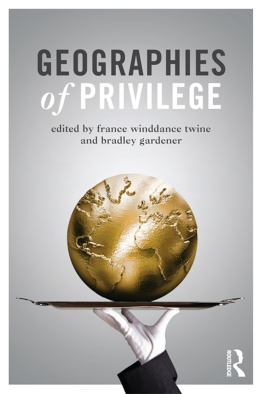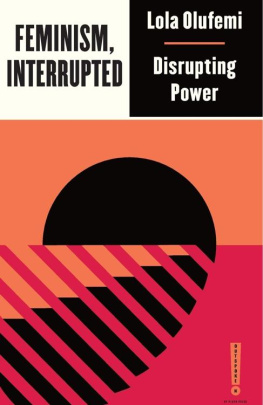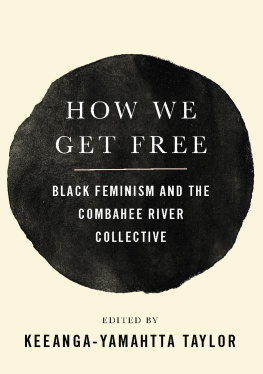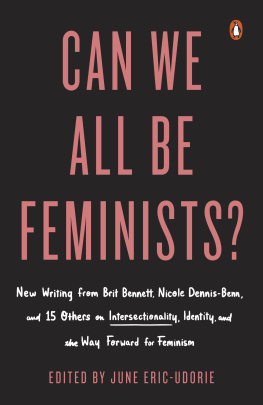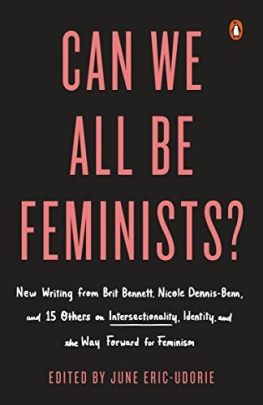Thank you for buying this ebook, published by NYU Press.
Sign up for our e-newsletters to receive information about forthcoming books, special discounts, and more!
Sign Up!
About NYU Press
A publisher of original scholarship since its founding in 1916, New York University Press Produces more than 100 new books each year, with a backlist of 3,000 titles in print. Working across the humanities and social sciences, NYU Press has award-winning lists in sociology, law, cultural and American studies, religion, American history, anthropology, politics, criminology, media and communication, literary studies, and psychology.
Feminism and Antiracism
Feminism and Antiracism
International Struggles for Justice
EDITED BY
France Winddance Twine
and Kathleen M. Blee
NEW YORK UNIVERSITY PRESS
New York and London
2001 by France Winddance Twine and Kathleen M. Blee
All rights reserved
Library of Congress Cataloging-in-Publication Data
Feminism and antiracism : international struggles for justice/edited
by France Winddance Twine and Kathleen M. Blee.
p. cm.
Includes index.
ISBN 0-8147-9854-3 (cloth : alk. paper)
ISBN 0-8147-9855-1 (pbk. : alk. paper)
1. Feminist theory. 2. Feminism. 3. Racism. 4. Sex discrimination
against women. 5. Race discrimination. I. Blee, Kathleen M.
HQ1190.F4189 2001
305.42dc21 2001002007
New York University Press books are printed on acid-free paper,
and their binding materials are chosen for strength and durability.
Manufactured in the United States of America
10 9 8 7 6 5 4 3 2 1
For Jonathan Warren
FRANCE WINDDANCE TWINE
For Pam, Eli, and Sophie
KATHLEEN M. BLEE
Contents
Kathleen M. Blee and France Winddance Twine
Heather Merrill
Veronica Magar
Siobhan Brooks
Delores M. Walters
Michelle Rosenthal
Ellen Kaye Scott
andrea breen
Yoshiko Nozaki
Sohera Syeda and Becky Thompson
Paola Bacchetta
Carolyn Martin Shaw
Eileen OBrien and Michael P. Armato
Jane Freedman
Cathleen L. Armstead
Ashwini Deshpande
Minelle Mahtani
Acknowledgments
We thank the contributors to this volume who responded to a Call for Papers that we issued in 1998. Their political and intellectual investments in social justice made this volume possible. We are also very grateful to all the feminist and antiracist scholars whose work has guided us, including but not limited to scholars in the following fields: gender and development studies, global feminisms, international feminisms, and transnational feminisms. Although we have met few of the feminists and antiracist scholars working in transnational feminisms we have been inspired and nurtured by their research and activism.
We received institutional support from the following during this project and thank our colleagues at the following institutions: Departments of Sociology at the University of California, Santa Barbara, the University of Pittsburgh, and the Henry M. Jackson School of International Studies at the University of Washington in Seattle. Winddance Twine would like to thank the Andrew Mellon Foundation and the participants in the 19992000 Sawyer Seminar at the University Center for International Studies at the University of North Carolina, Chapel Hill, which served as an intellectual home during the final editing of this volume. Winddance Twine also thanks the following colleagues and friends on both sides of the Atlantic for all the innumerable ways in which they continue to support her research (including the meals, rides to and from airports, lively debates, and unconditional friendship). In this vein Twine thanks (in England): Nelista Cuffy, Caroline Churchill, Amelia Dowdye, Rachel Hunte, Mary Hunte, Bernice Bennett, Owen Brown, Jane Brown, Mandy Burke, Gerry Burke, Sharon Dawkins, Janet Powell, and Cheryl Weathers; (in Ireland): Michael Smyth; (in South Africa): Julia Maxted and Abebe Zegeye; (in the United States): Ingrid Banks, William T. Bielby, Denise Bielby, Karen Brodkin, William Darity Jr., Troy Duster, Maria Franklin, Ruth Frankenberg, Arnell Hinkle, Kristin Luker, Mary Romero, Beth Schneider, Gay Seidman, Judy Taylor, Becky Thompson, Irma McClaurin, Ruth Mostern, Kenneth Mostern, Pedro Noguera, Darrel Robinson, KumKum Bhavnani, John Foran, Avery Gordon, Gail Hanlon, Ara Wilson, and John Wolfe.
Kathleen Blee thanks students in Feminist Theory and Gender, Race, Class seminars at the University of Pittsburgh as well as Lisa Brush, Kipp Dawson, Kathleen DeWalt, Patrick Doreian, Irene Frieze, Pam Goldman, Maurine Greenwald, Carol McAllister, Janet Montelaro, Marilyn Patete, Verta Taylor, Eileen VanSchaik, and Eileen Yacknin.
We would like to thank Despina Papazoglou Gimbel who, once again, worked diligently and with much patience and professionalism to keep this book on track. We owe Ms. Gimbel more gratitude than can be expressed here.
Finally Winddance Twine dedicates this book to her family who make the impossible possible for her each day: Mamie Lois Twine, Paul Christopher Twine, and Jonathan Warren. Kathleen dedicates it to Pam, Eli, and Sophie.
FRANCE WINDDANCE TWINE
Santa Barbara, California
and
KATHLEEN M. BLEE
Pittsburgh, Pennsylvania
October 2000
Foreword
Mary Romero
I read Feminism and Antiracism: International Struggles for Justice in the midst of the year 2000 U.S. election when the margin of victory was less than the margin of error. Internationally, the election debacle revealed some of the contradictions and hypocrisies of U.S. imperialist claims to be the guardian of democracy. Nationally we were confronted by strategists arguing the validity of charges lodged by diverse groups of disenfranchised citizens. It appears that standards requiring a recount are different for white middle-class retirees, for black Americans, and for mail-in ballots from overseas military personnel. Black Americans, Haitian Americans, and other citizens of color, largely ignored in the Supreme Court appeal, turned to the NAACP, the Rainbow Coalition, and other civil rights leaders to call for a federal investigation. Devices and maneuvers that disenfranchised Florida voters were as diverse as the groups affected: butterfly ballots, hanging chads, ballot tampering, destroyed ballots, voters turned away at the polls, racial profiling, and police harassment. The debates, lawsuits, and protests about U.S. electoral processesand the important literature I was readingfocused my attention on the need for a feminist and antiracist struggle to make every vote count. The sixteen cases presented in this volume make us recognize risks and dangers, efforts, and strategies used to build real democratic institutions. Reflecting on the creation of a womens center in Italy; the struggles to organize immigrant women from Somalia, Eritrea, the Ivory Coast, Morocco, Kenya, Yugoslavia, Spain, Germany, and Tunisia; or the efforts of white and black South Africans in a rape crisis centerI pondered the rich possibilities for uniting Blacks, Haitians, Jews, Latinos, the elderly, women, the poor, and military personnel behind the struggle to change the electoral system and put an end to voter disenfranchisement.


